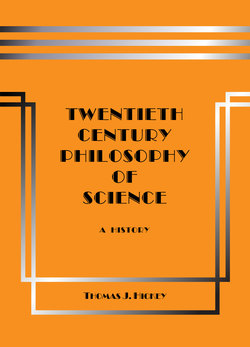Читать книгу Twentieth-Century Philosophy of Science: A History (Third Edition) - Thomas J. Hickey - Страница 115
На сайте Литреса книга снята с продажи.
Duhem on Physical Theory and Metaphysics
ОглавлениеPierre Duhem (1861-1916), another important early positivist, studied physics at the Ecole Normale in Paris, where he received a doctorate in physics, and was a professor of physics at the University of Bordeaux for most of his career. His principal interest was physical chemistry, where he aspired to recast the theoretical foundations of chemical processes on the basis of a generalized thermodynamics. Unlike Mach, Duhem accepted the Aristotelian metaphysics, which he viewed as separate from positivist physics, and believed that progress in physical theory asymptotically approaches a “natural classification”, which he equated to the cosmology of Aristotle. Duhem’s philosophy differed from Mach’s philosophy by the former’s acceptance of physical theory as integral to physics, and by his development of a semantical metatheory to locate theory in positivist physics. The contemporary pragmatist philosopher Willard van Quine elaborated Duhem’s semantical metatheory for mathematical physics into a general philosophy of language, and retrospection reveals that it has been Duhem’s more lasting philosophical contribution.
Mach influenced Duhem who in turn also called his own philosophy of science positivist. But there were other intellectual influences in Duhem’s thought, and as a result Duhem differed from Mach in at lease two important respects: firstly Duhem accepted scientific theory as a valid and integral part of science, and secondly he reserved a place in human knowledge for metaphysics. Mach’s philosophy is often called “scientistic”, by which is meant that only science offers valid knowledge and that no nonphenomenalist discourse, which is summarily called “metaphysical”, is valid. While Mach was a physicist, philosopher, historian of science, and atheist, Duhem was a physicist, philosopher, historian of science and believing Roman Catholic. Like Mach, Duhem rejected the mechanistic, atomistic physics although for very different reasons than Mach. Unlike Mach, Duhem wished to retain the natural philosophy and cosmology of the Aristotelian and Scholastic philosophies upon which had been built the theology of his religion since Thomas Aquinas.
The outcome of these differences between Mach and Duhem is a complex philosophy of science that affirms and protects the autonomy of physics from any encroachment by metaphysics, while conversely affirming and protecting the autonomy of metaphysics from any encroachment by physics. This mutual isolation of physics and metaphysics is due to Duhem’s view that on the one hand metaphysics, natural philosophy, and cosmology pertain to realities that are hidden and that underlie the phenomenal appearances accessible by the senses, while on the other hand physics pertains only to observed phenomena. Furthermore and contrary to Mach, Duhem maintained that theories are integral to physics and are valid science. The only criterion for scientific criticism of a theory, unlike a phenomenal description, is the theory’s ability to make predictions that are correct with a sufficient degree of approximation, i.e., correct within the range of indeterminacy produced by a degree of measurement error that always exists in experimental data. Thus when Duhem rejected mechanism, one reason that he gave is that no mechanical atomic theory has been found to be sufficiently accurate, when judged by his purely scientific criterion for the criticism of theories.
But his principal reason for saying that the autonomy of physical theory is protected from the metaphysical thesis that physics must be mechanistic, is that physical theory has a special semantics that forbids interpreting the hypothetical postulates realistically, even if a proposed mechanistic hypothesis were scientifically adequate. Physical theory in Duhem’s view can never have a realistic semantics. No metaphysical or cosmological philosophy may be called upon to supply theoretical physics with its axioms. For this reason Duhem denies that physical theory has any explanatory function in science; only metaphysics is able to “explain”, and metaphysics has no place in physics. The distinctive semantics of physical theory is a very strategic part of Duhem’s philosophy of science. His religious and other intellectual influences may have operated in his developing this distinctive philosophy of science, but his stratifying the semantics of the language of science into the realistic and the nonrealist has as its basis, reasons that are entirely integral to his concept of empirical science itself. These reasons are semantical, and must be examined before attempting an exposition of his philosophy of science.
